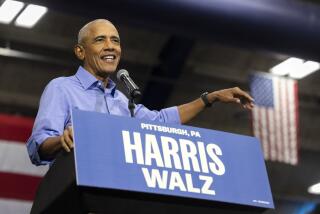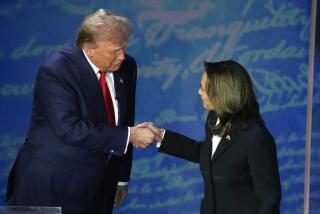Debate dwells on Obama’s past
- Share via
PHILADELPHIA — The Democratic candidates for president debated forcefully Wednesday over who would prove more electable in November, with Hillary Rodham Clinton repeatedly raising questions about Barack Obama’s past associations and Obama contending that her approach typified the blowtorch political style that Americans decry.
Obama, the Illinois senator, was thrown on the defensive for the first half of the nearly two-hour debate. The moderators, ABC News anchors Charles Gibson and George Stephanopoulos, pressed him on his recent comments about “bitter” small-town Pennsylvanians; his former pastor, the Rev. Jeremiah A. Wright Jr.; his acquaintance with a long-ago member of the Weather Underground group; and the absence of an American flag in his lapel -- though no one else on stage wore one.
Clinton criticized Obama as well. She defended those who she said were “taken aback and offended” by Obama’s remarks at a recent San Francisco fundraiser that voters upset by economic downturns “get bitter, they cling to guns or religion or antipathy to people who aren’t like them or anti-immigrant sentiment or anti-trade sentiment.”
The New York senator repeatedly zeroed in on Wright and -- after Stephanopoulos opened the issue -- Obama’s relationship with fellow Chicagoan William Ayers, the 1960s radical who is now an education professor at the University of Illinois. She noted that Obama and Ayers were at one point on the same philanthropic board.
“I think it is, again, an issue that people will be asking about,” said Clinton, who repeatedly characterized herself as thoroughly vetted during her husband’s administration.
Adopting a more-in-sorrow-than-anger mien, she added: “I know Sen. Obama’s a good man, and I respect him greatly, but I think that this is an issue that certainly the Republicans will be raising. And it goes to this larger set of concerns about, you know, how we are going to run against John McCain,” the unofficial GOP nominee.
Obama noted that Clinton’s husband had pardoned associates of the Weather Underground in the closing days of his tenure, and sought to turn Clinton’s barbs into proof that he, in November, would be able to “take a punch.” He renewed his objections to Wright’s most inflammatory statements but said that they had overshadowed the good he had done as pastor, until recently, of Obama’s Chicago church.
The reference to Ayers, whom Obama characterized as a casual acquaintance, led the Illinois senator to upbraid Stephanopoulos and by extension Clinton. It made no sense, Obama said, that he be blamed for “somebody who engaged in detestable acts 40 years ago when I was 8 years old.”
More broadly, Obama argued that Clinton’s approach was the very thing his campaign was meant to change. Defending his comments about the economically disaffected -- which he acknowledged were “mangled up” -- he said that as a person of faith and one who respected the rights of gun owners, he meant no insult.
“The problem that we have in our politics, which is fairly typical, is that you take one person’s statement, if it’s not properly phrased, and you just beat it to death. And that’s what Sen. Clinton’s been doing over the last four days,” he said.
He expressed sympathy for criticism Clinton has received over the years from political opponents.
“But the problem is that that’s the kind of politics that we’ve been accustomed to,” he said. “And I think Sen. Clinton learned the wrong lesson from it, because she’s adopting the same tactics. What the American people want are not distractions. They want to figure out how are we actually going to deliver on healthcare; how are we going to deliver better jobs for people; how are we doing to improve their incomes; how are we going to send them to college?”
The Philadelphia debate, aired nationwide on ABC from the National Constitution Center, followed days of bickering between the two candidates over Obama’s San Francisco comments. Clinton hammered Obama in appearances and on the airwaves, praising the role of faith and gun ownership in many voters’ lives. That prompted retaliatory comments and an ad from Obama that characterized Clinton’s response as evidence of the kind of politics he means to eradicate.
The tenor of the feud underscored the stakes, particularly for Clinton, in Tuesday’s Pennsylvania primary. Behind in delegates and losing ground among the party superdelegates, whose judgments may determine the nominee -- since neither will reach the magic nomination number on elected delegates alone -- Clinton is counting on an emphatic victory to give her momentum for future contests in North Carolina and Indiana.
But her once-substantial lead in public opinion polls in Pennsylvania had slipped in the weeks since the last big contests in March. A Los Angeles Times/Bloomberg poll published Wednesday showed Clinton with a 5-percentage-point lead, well below the margin she would need to make meaningful inroads into Obama’s lead among delegates and in the popular vote.
During the debate, the 21st among Democratic candidates but the first since the two squared off in Cleveland in February, Clinton appeared to be directing her appeal to the superdelegates as much as to voters. While Obama repeatedly castigated McCain’s policies, including the Republican’s proposals to address the nation’s mortgage crisis, Clinton implied that Obama would run a poor second to McCain in November were he to be the Democratic nominee.
Twice Stephanopoulos asked Clinton whether Obama could beat McCain before she offered, “Yes. Yes. Yes. Now, I think I can do a better job.”
Asked whether Clinton could beat McCain, Obama quickly offered, “Absolutely, and I’ve said so before.”
Both candidates invoked pledges of party unity, whomever ends up with the nomination. But Clinton’s was worded oddly for a candidate who has promised to fight on until the summer convention.
“I will do everything to make sure that the people who supported me support our nominee,” Clinton said early in the debate. “I will go anywhere in the country to make the case.”
With the moderators and Clinton raising assorted questions about Obama’s past for the first half of the debate, issues received relatively short shrift. Not until 50 minutes in was a policy issue -- Iraq -- asked about by the moderators. More than an hour went by before a question was asked about what Stephanopoulos called “the No. 1 issue on Americans’ minds” -- the economy.
Asked about McCain’s accusations that the Democratic nominee would raise taxes, Clinton flatly ruled out a tax hike on middle-class Americans, whom she defined as those making less than $250,000 per year. Obama countered that he planned to lower taxes on the middle class, but he left open the option of raising capital gains taxes.
Clinton criticized his proposal to raise the threshold for Social Security payroll taxes, arguing that would hit “educators in the Philadelphia area or in the suburbs, police officers, firefighters and the like.”
Obama said the threshold now was $97,000 a year -- meaning only those who made more than that would be affected by a hike. “Most firefighters, most teachers, you know, they’re not making over $100,000 a year,” he told Clinton.
Given the lengths they have gone to recently to express understanding of Pennsylvania’s many gun owners, both candidates were visibly uncomfortable when asked to explain their positions on gun control. It was, they were reminded, the first anniversary of the shootings at Virginia Tech.
Both voiced support for local governments’ rights to place limits on guns. Neither would take a position on the handgun ban the District of Columbia is fighting to uphold before the Supreme Court.
“I confess, I obviously haven’t listened to the briefs and looked at all the evidence,” Obama said.
“I don’t know the facts,” Clinton said.
With acrimony marking the closing days before the Pennsylvania contest, the first question posed to the candidates drew an unintentionally comical response.
Moderator Gibson raised a proposal by former New York Gov. Mario M. Cuomo -- and countless voters -- that the two team up on the ticket in November. Why not? Gibson asked.
There was a pause, which extended until laughter broke out in the audience and the candidates smiled.
“Don’t all speak at once,” Gibson said.
Both candidates offered promises of party unity. And nothing more.
--
noam.levey@latimes.com
Decker reported from Los Angeles and Levey from Philadelphia.
More to Read
Sign up for Essential California
The most important California stories and recommendations in your inbox every morning.
You may occasionally receive promotional content from the Los Angeles Times.















